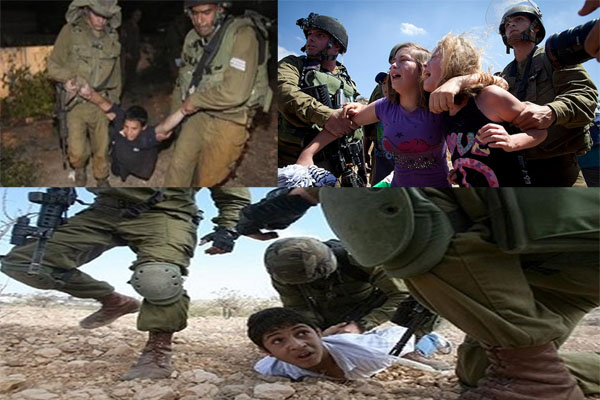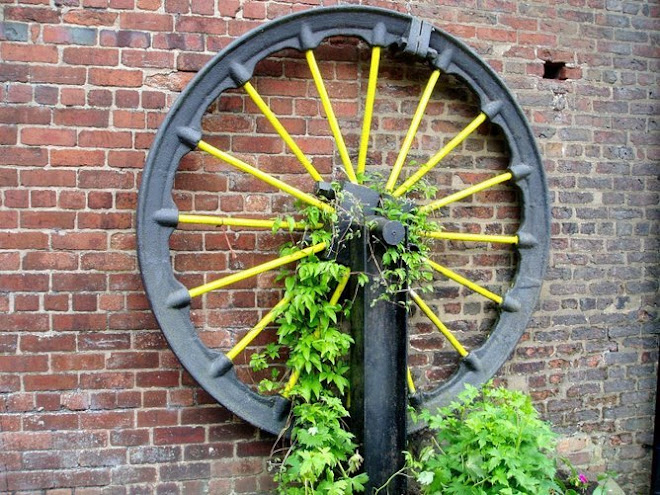Mistreating Palestinian Children
Societies perhaps are best judged by how they treat prisoners, their most disadvantaged and children.
On March 20, Israeli soldiers mass arrested about 30 children. Obama
arrived the same day. Every child passing Tareq Bin Zeyad street was
seized. They were heading for school in Hebron.They were taken to Kiryat Arba police station. They were interrogated with no adult present. Israel’s Youth Law requires it. Shin Bet pays it no heed. Children are isolated from parents. They’re terrorized. It’s standard Israeli practice.

Targeted children committed no crimes. An Israeli army spokeswoman said soldiers “operated in the area today in order to contain rock hurling at security forces (following an increase in) rioting.”
At least 14 were aged 11 or younger. Some were young as 8. Israel treats children like adults. International law is clear. A child is anyone under age 18. State Parties are legally bound to treat them accordingly.
Principle 1 of the UN Declaration of the Rights of the Child says:
“Every child, without exception whatsoever, shall be entitled to (fundamental human and civil) rights, without distinction or discrimination on account of race, colour, sex, language, religion, political or other opinion, national or social origin, property, birth or other status, whether of himself or of his family.”
They’re entitled to special protections and opportunities. It’s to help them develop physically, mentally, morally, spiritually, and socially. It’s so they’ll do it under conditions of freedom and dignity.
They include the right to life, an adequate standard of living, healthcare, education, leisure, safety and peace. For over four decades, Israel systematically denied Palestinians all rights.
On March 31, Haaretz headlined “The IDF must stop arresting children,” saying:
On March 20, Israeli soldiers “ambushed and arrested” Palestinian children. At least 18 were under age 12. They’re below “the minimum age at which they can legally be held responsible for a crime.”
“This large-scale roundup was arbitrary.” Soldiers grabbed every child they saw. First and second-graders aged 8 or younger were taken.
Doing so was reprehensible. International law forbids it. So does Israeli law. Arrests came days after a UNICEF report. It’s titled “Children in Israeli Military Detention.”
It sharply criticized Israel. It said around 700 Palestinian children aged 12 – 17 are arrested annually. It’s about two per day. Thousands have been mistreated. They’re terrorized. They’re harshly interrogated.
Doing so “amount(s) to cruel, inhuman or degrading treatment or punishment.”
The Convention on the Rights of the Child mandates that they be kept safe from harm.
Article 4 states:
“Governments have a responsibility to take all available measures to make sure children’s rights are respected, protected and fulfilled.”
Article 37 states:
“No one is allowed to punish children in a cruel or harmful way. Children who break the law should not be treated cruelly.”
Other provisions mandate State Parties to ensure that “No child shall be subjected to torture or other cruel, inhuman or degrading treatment or punishment.”
“Every child deprived of his or her liberty shall have the right to prompt access to legal and other appropriate assistance, as well as the right to challenge the legality of the deprivation of his or her liberty before a court or other competent, independent and impartial authority, and to a prompt decision on any such action.”
Israel spurns international law. It violates its own. It ignores its High Court rulings. According to UNICEF:
“In addition to Israel’s obligations under international law, the guiding principles relating to the prohibition against torture in Israel are to be found in a 1999 decision of the Supreme Court, which is also legally binding on the Israeli military courts.”
“The Court concluded that a reasonable interrogation is necessarily one free of torture and cruel, inhuman or degrading treatment, and that this prohibition is absolute.”
Based on interviews UNICEF conducted, abuse and mistreatment persist. It’s consistent during arrest, transfer, detention and interrogation.
Heavily armed soldiers break into homes pre-dawn. Parents and children are terrorized. Threats and physical violence follow. Fundamental rights are systematically denied.
UNICEF calls Israeli mistreatment “widespread, systematic and institutionalized.” Children are taken from their families. They’re detained. They’re terrorized under harsh conditions. Many become traumatized.
“In no other country are children systematically tried by juvenile military courts that, by definition, fall short of providing the necessary guarantees to ensure respect for their rights.”
On March 29, Gideon Levy headlined “Aged eight, wearing a Mickey Mouse sweatshirt, and placed in Israeli custody,” saying:
Hebron area Palestinian children “never made it to school this week. IDF troops lay in ambush for them.”
Hebron residents were unnerved. They saw dozens of Israeli soldiers on streets and rooftops. They were justifiably frightened.
Children were arrested indiscriminately. An International Solidarity Movement volunteer videotaped what happened. She sent it to B’Tselem. It’s available on its web site and YouTube.
Israel deported the photographer the same day. Western media ignored what happened.
“Ahmed Abu Rimaileh woke up at 7 that morning,” said Levy. His mother gave him pocket money. He left for school. He stopped to buy cookies. He kept another shekel for recess.
He was about to leave the store. Seven or eight children rushed in. So did soldiers. Arrests followed.
Ahmed was scared. He began crying. He and other detained children “were thrust into an army vehicle.” Some sat. Others stood. One child was hit. They were taken to Kiryat Arba police station.
They were placed in a closed courtyard. They were told to sit on the ground. Children over age 12 were separated from younger ones. They were taken to Ofer Prison.
“Children asked to go to the bathroom but were forbidden to do so.” Police asked who threw stones. No one confessed. They were asked if they knew who threw them. Two older children were named. They’d been arrested and separated from others.
Ahmed was released. The next day he didn’t want to go to school. Who could blame him. His parents persuaded him. He didn’t go to classes. He stayed in the principal’s office all day.
“He wants to be a doctor when he grows up….His mother says he is a good student and a good boy.” He has “seven brothers and sisters. The five boys sleep in one room, on two beds and on mattresses on the floor.”
Ahmed’s mother knows Israeli arrests happen often. “We are used to it,” she said. It doesn’t make it right. It gets worse. Palestinian children are terrorized, traumatized, tortured, abused, and imprisoned. Most sentences range from two weeks to 10 months.
Sworn affidavits obtained from the Public Committee Against Torture in Israel (PACTI), Adalah, DCI-Palestine, and other human rights groups say systematic cruel, inhuman and degrading treatment are commonplace.
Children are forcefully arrested, painfully handcuffed, blindfolded, intimidated, verbally abused, strip searched, beaten, threatened, isolated, sexually threatened and abused, and forced to sign confessions in Hebrew they don’t understand.
It’s standard practice. On average, it happens twice daily. What’s a child to do? Going to school, running errands for parents, or playing with friends is risky. Normal life under occupation’s impossible.
Charging children with stone throwing is commonplace. It’s unconscionable. It happens daily. Under Military Order 1651, Section 221, it’s punishable as follows:
against people or property, it carries a maximum 10 year penalty; for children aged 13 or younger, it’s six months; and throwing stones or other objects against moving vehicles risks up to 20 years imprisonment; for children 13 or younger, it’s six months.
In practice, it’s two weeks to 10 months. It’s unjust, improper and lawless. It persists. Anything goes is policy. Young children are treated like adults. Some never fully recover from the experience.
MISTREATING PALESTINIAN CHILDREN

No comments:
Post a Comment